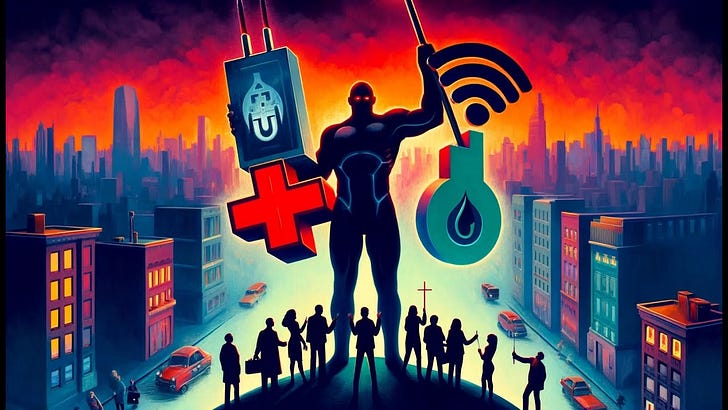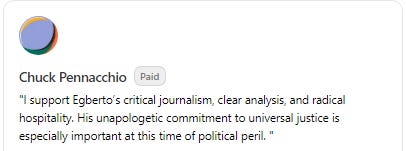Take healthcare, utilities, energy, and the internet away from the corporatocracy.
IMPORTANT READ: Critical resources, like healthcare, which represent our society's commons, must be wrested from the grips of corporatocracy to ensure a more equitable distribution of resources.
A quick but important note before reading this prescient article
Effective today, we have 9.98 thousand followers and 103 supporting (paid) subscribers. WE NEED HUNDREDS MORE, especially in this political climate. Misinformation funded by the deep pockets of our Oligarchy floods the internet. We are using all our platforms on-air, online, and in publications to counter that. We ask that you invest the equivalent of less than a coffee to ensure we can keep doing this. Please invest in a Democracy that serves all of us by becoming a paid subscriber. It comes with many benefits.
Healthcare, utilities, energy, & the internet belong to the commons.
The concept of “the commons” encompasses resources and services that belong to everyone and are integral to our well-being and progress. These include healthcare, utilities, energy, and the internet. The current corporatocracy—where a few corporations wield disproportionate power over these vital sectors—poses a significant threat to these resources’ equitable distribution and sustainable management. We must reclaim these sectors from corporate control, ensuring they serve the public good rather than private profit.
The Commons: A Collective Right
The commons represent resources and services that should be universally accessible and equitably shared. These include natural resources like air, water, and land and socially constructed resources like knowledge, healthcare, and the internet. The notion that no individual or corporation should own these resources is fundamental to the idea of the commons. However, the corporatization of these sectors has led to a scenario where access to essential services is often determined by one’s ability to pay rather than being a guaranteed right.
The Internet: A Knowledge Commons
The internet, a modern-day knowledge commons, epitomizes this issue. It is a vast repository of information, much of which is user-generated. When individuals write articles, post comments, or share information online, they contribute to a collective pool of knowledge. Yet, tech giants like Google and Facebook monetize this user-generated content without fair recompense to its creators. These corporations aggregate and sell data, profiting immensely while contributing minimally to the public infrastructure that supports this digital ecosystem.
Moreover, a few corporations’ increasing monopolization of the internet stifles innovation and restricts access. High-speed internet should be a public utility that is accessible to all, regardless of geographical location or economic status. Ensuring universal access to the Internet would promote educational opportunities, foster innovation, and enhance democratic participation.
Energy: A Natural Resource for All
Energy, particularly oil, is another area where corporatization has led to gross inequities. Oil is a natural resource formed over millions of years through geological processes. It exists on the earth, not through the efforts of any corporation but through natural processes. However, corporations extract, process, and sell this oil at exorbitant prices, claiming ownership over something that fundamentally belongs to everyone.
The environmental impact of fossil fuel extraction and consumption is profound. It contributes to climate change and public health crises, costs that are externalized to the public while profits are privatized—you pay for your asthma, cancer, and climate-change-caused damage as you also pay for their wealth.
This scenario calls for a rethinking of energy as a commons. Transitioning to renewable energy sources and treating energy as a public good can mitigate environmental damage and ensure equitable access to energy resources.
Healthcare: A Fundamental Human Right
Healthcare is perhaps the most glaring example of the failure of corporatocracy. In the United States, healthcare is treated as a commodity rather than a right. Insurance and pharmaceutical corporations prioritize profits over patient care, resulting in exorbitant costs and inequitable access. The United States spends more on healthcare than any other developed nation, yet it has some of the worst health outcomes.
A publicly funded, universal healthcare system would ensure everyone has access to the care they need, regardless of their financial situation. It would eliminate the inefficiencies and inequities of the current system, where millions remain uninsured or underinsured. Moreover, a universal system could improve public health and reduce long-term costs by focusing on preventive care and addressing social determinants of health.
Utilities: Essential Services for All
Utilities, including water and electricity, are essential for daily life. Yet, in many parts of the world, private corporations control these services, prioritizing profit over accessibility and sustainability. This has led to scenarios where people in low-income communities face shutoffs and exorbitant rates while corporate profits soar.
Public ownership of utilities would ensure these services are managed for the public good rather than private gain. It would enable investments in sustainable infrastructure, ensure fair pricing, and provide universal access. Additionally, public utilities could prioritize renewable energy sources, contributing to broader environmental sustainability goals.
The Path Forward: Reclaiming the Commons
Reclaiming healthcare, utilities, energy, and the internet from corporate control requires bold policy interventions and a shift in public consciousness. It involves recognizing these sectors as fundamental to our collective well-being and ensuring they are managed in the public interest.
Firstly, regulatory frameworks must be strengthened to prevent corporate abuses and ensure accountability. This includes robust antitrust laws to break up monopolies and prevent market dominance. Public investment in infrastructure, research, and development can also drive innovation and ensure equitable access.
Secondly, there must be a cultural shift towards valuing the commons and recognizing the interdependence of all individuals. This involves fostering a sense of collective responsibility and promoting policies that prioritize public welfare over private profit.
Conclusion
The corporatization of healthcare, utilities, energy, and the Internet undermines the equitable distribution of essential resources and services. By reclaiming these sectors as part of the commons, society can ensure they serve the public good, promote sustainability, and foster innovation. This requires a combination of regulatory reforms, public investment, and cultural shifts toward valuing the collective over the individual. Doing so can create a more just, equitable, and sustainable future for all.
Can we count on you to help us reach our goal of 100 new paid subscriptions by month’s end?
The other side has big donors and everyday citizens who invest heavily in platforms that lie and misinform. All we have is you. So, please invest in our media outlet by clicking the subscribe button below to become a paid subscriber. You won’t miss that coffee, but it will make a difference in our politics as we spread the truth about our policies and progressive politics. All paid subscribers get to read my five books on this platform and all subsequent books I write. They will also be privy to subsequent incentives.







